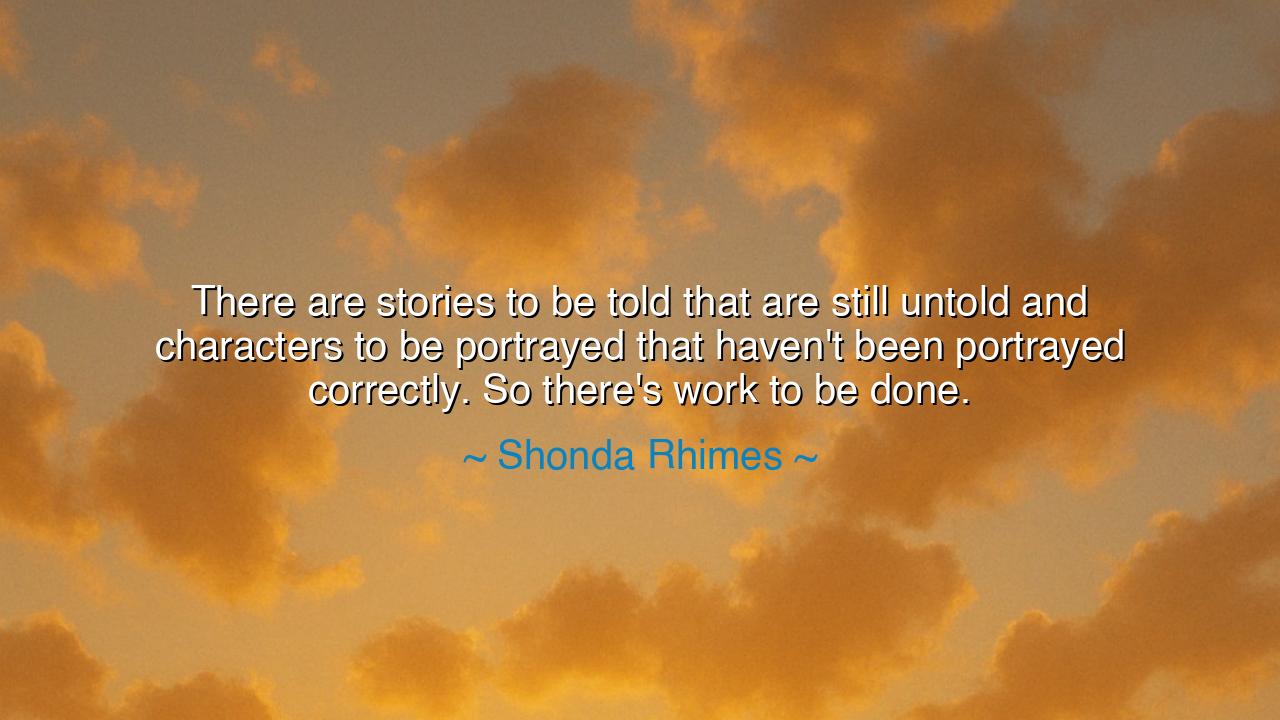
There are stories to be told that are still untold and
There are stories to be told that are still untold and characters to be portrayed that haven't been portrayed correctly. So there's work to be done.






Hear the voice of Shonda Rhimes, storyteller of power and vision, who declared: “There are stories to be told that are still untold and characters to be portrayed that haven’t been portrayed correctly. So there’s work to be done.” In this proclamation lies the eternal truth that the tapestry of human experience is vast, and yet many threads remain hidden, waiting for the hand of the weaver to bring them to light.
She speaks of stories untold, the voices silenced by time, neglect, or injustice. These are the tales of the unseen, the forgotten, the marginalized. To bring them forth is not merely an act of art, but of justice, for in telling them the world is widened, and the fullness of humanity is revealed.
She names also characters not portrayed correctly, for too often the images of people have been distorted by ignorance or prejudice. To reshape these portrayals is to restore dignity, to reflect truth, and to offer the world mirrors in which all may see themselves with clarity and honor. In this task lies both courage and responsibility, for to misrepresent is to wound, but to represent truthfully is to heal.
Thus she concludes: there is work to be done. The labor of the storyteller is never complete, for each age requires new voices, new visions, and new reckonings with the human spirit. This work is both burden and blessing, for it demands perseverance, yet offers the chance to shape the hearts of generations.
Therefore, O seekers, remember: art is not only for delight, but for revelation. The world is filled with untold stories and misrepresented souls, and to tell them rightly is a sacred duty. In Rhimes’s words we hear the wisdom of the ancients—that truth must be spoken through tale, and that in every age, the storyteller’s work is the light by which humanity sees itself. Would you like me to frame this as a parable of the unfinished book, whose blank pages await the hand of those brave enough to write what has been ignored?






P9Anh Phuong 9A
Shonda Rhimes’ quote makes me think about the lack of diversity in many narratives we see in media today. There’s still so much to be done in terms of telling stories that reflect the true diversity of human experience. What steps can we take to ensure that these untold stories are told authentically, without falling into the trap of cliches or misrepresentation? How can creators balance authenticity with creativity in this work?
ATduong do anh tai
I love Shonda Rhimes' emphasis on the untold stories and underrepresented characters. It’s such an important reminder of the responsibility artists and creators have to bring fresh perspectives to the table. However, I wonder, is it possible to truly capture the complexity of these characters and stories in mainstream media? What barriers exist that prevent these voices from being heard, and how can we overcome them?
HTNguyen Thi Hai Tuyet
Rhimes' quote speaks to the ongoing work required in the entertainment industry to tell authentic and diverse stories. There’s so much room for improvement, especially when it comes to portrayals of marginalized communities. But what challenges do creators face when trying to present these untold stories in a way that feels true to the experiences they’re representing? How can we avoid misrepresentation or stereotypes while ensuring these stories are shared?
NMNhung My
I completely agree with Shonda Rhimes that there’s still so much work to be done in terms of representation in media. It’s frustrating to see how certain characters and stories have been left out or misrepresented for so long. How do we create more opportunities for underrepresented voices to tell their stories? Is it enough to just tell untold stories, or do we need to rethink how we approach storytelling altogether?
TTNguyen Thanh Tam
Shonda Rhimes' statement is a powerful reminder of the untapped potential in storytelling. There are so many narratives and characters that have yet to be explored or represented authentically. But what does it take to ensure these stories are told in a way that resonates? How do we encourage more diverse voices and perspectives in media without tokenizing or oversimplifying the issues they bring to the table?